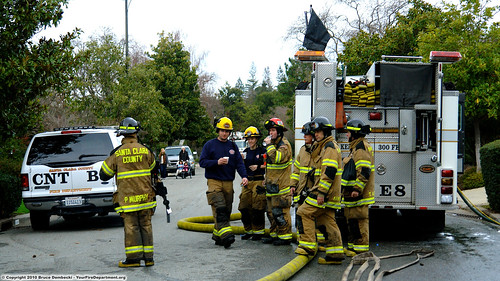Sometimes learning after an event should be instantaneous, as in the "Tailboard AARs" used by fire crews.
 The Tailboard AAR is a term used by the Fire Service to describe a short Knowledge-sharing session (an After Action Review) that should happen immediately after activity, around the Tailboard of a fire truck, if necessary.
The Tailboard AAR is a term used by the Fire Service to describe a short Knowledge-sharing session (an After Action Review) that should happen immediately after activity, around the Tailboard of a fire truck, if necessary.The great thing about this reflective event is that it should happen immediately, while the team are still "present in the moment", before they get back to base, before memories start to shift, and while the shared experience they have just been through is still at it's most vivid.
Here's what the Fire Service says
"For (Goodyear Arizona Fire Department Chief) Russ Braden, AARs provide the first level of learning for the organization and the best opportunity for constructing a safety-aware working culture. “Quite simply put, this is nothing more than a crew taking a few minutes to review the incident or a recent event. This is the time within the safety of their crew to review what went well, what can be improved, or what didn’t work at all. This type of learning environment will begin to spread lessons to each of the work groups, shifts, and to the rest of the department as it perpetuates.”
District employees for the Northwest Fire District in Tucson, AZ, recently began carrying AAR pocket cards to facilitate the district wide use of “tailboards.”
At a recent meeting of district Battalion Chiefs, personnel said the AARs were making impacts on the organization in several different ways. Captain Tim Graves said one of the best features of the four-question AAR that he’s found is its adaptability to the scale of the incident. .....
Battalion Chief Mike Duncan said “I think the AARs are a very critical trust piece: people learn that it’s OK to bring out actions that didn’t go as planned. ...
Division Chief Kelly McCoy said he thought the AAR format was helping to promote the mindset of planning. ... Other personnel said what they liked about the AAR process was that it was easy to use with a group.”After Action Reviews have been around for a long time as a Knowledge Sharing tool, and the experience of the Fire Crews reminds us of some of the AAR ground rules.
- Hold your AAR immediately after activity. For the fire crews, it's round the truck tailboard. For a sales team, it might be the a Back of the Taxi AAR. For a legal team, it might be a Courtroom Steps AAR. For a forestry team, it's still a Tailboard AAR, but the tailboard is a logging truck.
- Hold your AAR routinely. By tagging it to the tailboard, the taxi or the courtroom steps, you introduce a trigger for review and reflection.
- Give people support. Give them the Pocket Cards. Allow them to adapt them to the needed scale.
- Carry the AARs through into planning.




No comments:
Post a Comment